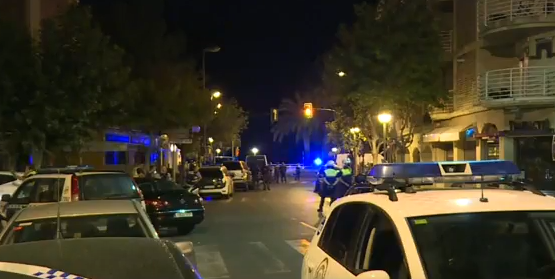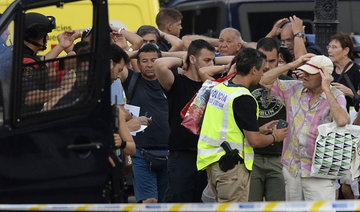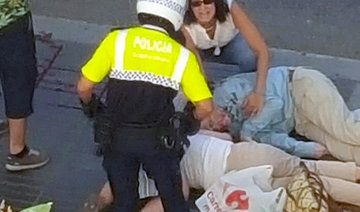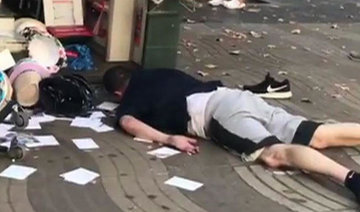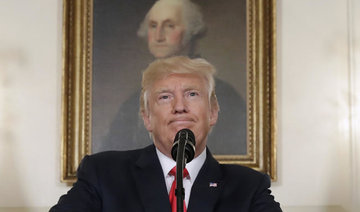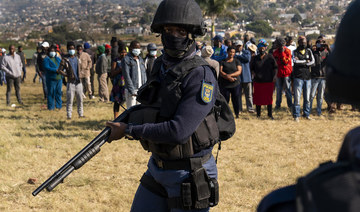BARCELONA Spanish police on Friday shot dead five suspected terrorists in a city south of Barcelona where a van mowed into pedestrians the day before, killing 13 people.
The police force in Catalonia region said the suspects were carrying bomb belts, all of which were later detonated by bomb specialists.
The suspects were killed in the resort town of Cambrils during a police response to a terrorist attack in which five civilians and one police officer were wounded. Two of the wounded are in serious condition.
Police said they were working on the theory that the Cambrils suspects were linked to the attack on the Barcelona promenade and an earlier explosion in the town of Alcanar in which one person was killed.
They cannot say yet how the civilians and police officer in Cambrils were injured. Local media have reported a vehicle crashed into a police car and nearby civilians and that police shot the attackers, included one brandishing a knife.
Hours after Thursday's deadly van attack in Barcelona, which was claimed by the Daesh to have been carried out by its "soldiers," police arrested two men, a Moroccan and a man from Spain’s north African enclave of Melilla, and were hunting the driver, who witnesses said have fled on foot. Witnesses said the white van zigzagged at high speed down Las Ramblas, a busy avenue thronged with tourists, ramming pedestrians and cyclists, sending some hurtling through the air and leaving bodies strewn across the ground.
It was still not clear how many attackers had been involved.
Authorities said the death toll could rise, with more than 100 people injured, some seriously.
Daesh claims responsibility
Daesh’s Amaq news agency said: “The perpetrators of the Barcelona attack are soldiers of the Islamic State and carried out the operation in response to calls for targeting coalition states” — a reference to a US-led coalition against the Sunni militant group.
Spain has several hundred soldiers in Iraq providing training to local forces in the fight against Daesh, but they are not involved in ground operations.
The Daesh claim could not immediately be verified.
If the involvement of Islamist militants is confirmed, it would be the latest in a string of attacks in the past 13 months in which they have used vehicles to bring carnage to the streets of European cities.
That modus operandi — crude, deadly and very hard to prevent — has killed well over 100 people in Nice, Berlin, London and Stockholm.
British tourist Keith Welling, who arrived in Barcelona on Wednesday with his wife and 9-year-old daughter, said they saw the van drive past them down the avenue and took refuge in a restaurant when panic broke out and the crowd started running.
“People were shouting and we heard a bang and someone cried that it was a gunshot ... Me and my family ran into the restaurant along with around 40 other people.
“At first people were going crazy in there, lots of people crying, including a little girl around three years old.”
It was the deadliest attack in Spain since March 2004, when Islamist militants placed bombs on commuter trains in Madrid, killing 191 people and wounding more than 1,800.
Nothing more than criminals
Spanish Prime Minister Mariano Rajoy announced three days of official mourning for what he called a “jihadist attack.”
“Today the fight against terrorism is the principal priority for free and open societies like ours. It is a global threat and the response has to be global,” he told a news conference in Barcelona.
The Spanish royal household said on Twitter: “They are murderers, nothing more than criminals who are not going to terrorize us. All of Spain is Barcelona.”
US President Donald Trump said: “The United States condemns the terror attack in Barcelona, Spain, and will do whatever is necessary to help.”
He added: “Be tough & strong, we love you!“
Bodies on the ground
Catalan police said the two men detained on Thursday had been arrested in two towns, Ripoll and Alcanar, both in the region of Catalonia, of which Barcelona is the capital.
The explosion was also in the town of Alcanar, in the early hours of Thursday. One person died and another was injured in that incident, police said.
Mobile phone footage showed several bodies strewn along the Ramblas, some motionless. Paramedics and bystanders bent over them, treating them and trying to comfort those still conscious.
Around them, the boulevard was deserted, covered in rubbish and abandoned objects including hats, flip-flops, bags and a pram.
Belgium’s foreign minister said a Belgian was among the dead.
Regional head Carles Puigdemont said people had been flocking to hospitals in Barcelona to give blood.
Susana Elvira Carolina, 33, who works at a shop on Las Ramblas, had just entered her building when the van struck.
“We had a window and you could see the bodies lying from there, you could see how people were run over ... We were shutting down the blinds but people kept coming in and we had to keep it open so they could enter the shop.”
Tourist draw
The incident took place at the height of the tourist season in Barcelona, which is one of Europe’s top travel destinations with at least 11 million visitors a year.
French President Emmanuel Macron, whose nation has suffered some of Europe’s deadliest militant attacks in recent years, tweeted: “All my thoughts and France’s solidarity to the victims of the tragic attack in Barcelona.”
A Vatican spokesman said Pope Francis was praying for the victims and wanted to express his closeness to all Spanish people, especially the victims and their families.
Authorities in Vic, a small town outside Barcelona, said a van had been found there in connection with the attack. Spanish media had earlier reported that a second van had been hired as a getaway vehicle.
Barcelona is the capital of the wealthy northeastern region of Catalonia, which plans to hold a popular vote on Oct. 1 on whether it should secede from Spain. The central government says the vote cannot go ahead because it is unconstitutional.
Before Thursday’s attack, government data showed that police had arrested 11 suspected jihadists in the Barcelona area so far this year, more than anywhere else in Spain.


